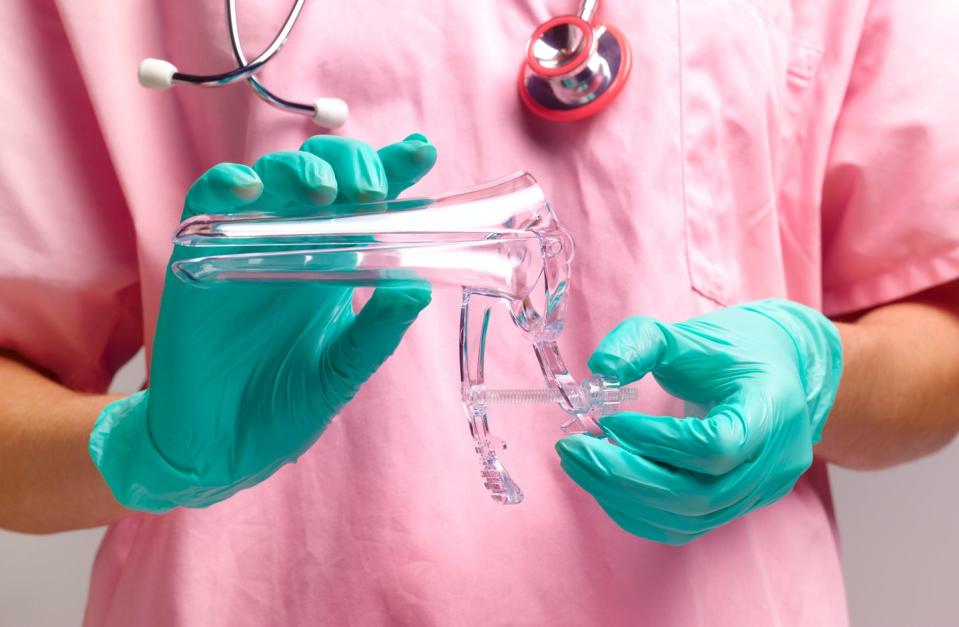Love Island's Amy on how she's dealing with 'abnormal cells' while pregnant
Whilst having a smear test isn't exactly at the top of our list of 'fun things to do', they are a health essential for anyone with a cervix – something that former Love Island star, Amy Hart, who recently announced her pregnancy, knows all about. After being diagnosed with HPV back in May, she said she was later informed by a nurse that it appears she has 'high grade cells' and had a colposcopy in June.
Of course, we all hope that our smear test results will come back saying 'all clear', but in reality sometimes an issue may be picked up along the way (which is a good thing! Rather than it being left unattended to), including a result that says you have 'abnormal cells'. Although being called 'abnormal' makes it sound like a rare experience, it's actually thought that one in twenty will see this result, including reality star Amy, but please don't worry: this does not mean you have cancer.
According to Eluned Hughes, Health Information Manager at Jo's Cervical Cancer Trust, an abnormal cervical screening result may just "mean you have HPV (human papillomavirus), an extremely common virus that almost everyone will get at some point in their life."
And as per the NHS, while abnormal cells themselves are not cancerous, there's a risk that they could become cancerous (years down the line) if not treated – and so your doctor may advise that your cervix is investigated further via a quick procedure called a colposcopy. A tiny sample of your cervix may be removed and sent off for testing, before the doctors decide if any follow-up treatment or tests are needed. The results of a colposcopy may come back saying you have CIN1 cells (low risk - no treatment needed), CIN2 cells (medium risk - you may be offered treatment to remove the cells, or further monitoring) or CIN3/CGIN cells (high risk, treatment will be offered).
This all sounds straightforward, but what happens if - like Amy - you get an 'abnormal cells' result from a smear test and you're pregnant?
Speaking about her experience on her Instagram Stories, Amy revealed, "So HPV, I've got CIN1 and CIN2 on my cervix. The lady told me 'Do not get pregnant till I've taken these cells out.' I didn't know at the time that I already was pregnant. So now I'm under a consultant. They are trying not to take them out because they can cause miscarriage or early labour. Obviously, hopefully we can leave them but it's all been quite scary."
Later, she further shared her experience with her followers; in an image caption, Amy said that she'd had a scan, had chatted to the midwife and added that she's also currently dealing with fibroids, but that her doctor doesn't think they'll impact on the baby. "In case you missed my story, I also have CIN 1& 2 on my cervix which will be monitored by a consultant as removing them can cause early labour or [miscarriage]," she said.
As for what the normal process is should you discover you have abnormal cells during pregnancy, according to Cancer Research UK, just as Amy said, it's fairly straightforward and will involve being monitored (and of course if you have any concerns whatsoever, it's best to ask your doctor or midwife about them directly).

"If [smear test] results come back as abnormal, or if a test you had just before you became pregnant shows abnormal results, you don't need to worry," explains the charity. "This doesn't mean that you have cancer, but that there are some abnormal cells that can be easily treated a few months after the birth.
"You may need to have a colposcopy (a close examination of your cervix and vagina) while you are pregnant. This is safe to have during pregnancy, and your doctor can see how much the cells on your cervix have changed."
Cancer Research UK adds that if you only have "mild changes to the cells on your cervix (CIN 1), you won't need to have any treatment until around 3 months after your baby is born" and that later on, you may need a follow-up colposcopy to check the cervical cells again. "In many women with mild changes, they go back to normal without any treatment."
For those, also like Amy, with CIN 2 or CIN 3 cells, again it's unlikely they'll change much during the duration of pregnancy, but a colposcopy around the six-month mark may be required.
The bottom line? Don't stress, ask your medical team as many questions as you need to until you feel reassured and remind your loved ones to get their smear test - it's so important.
This article is not intended to be a substitute for professional medical advice or diagnosis. Always seek the advice of your physician or other qualified health provider with any questions you may have regarding a medical condition.
You Might Also Like


